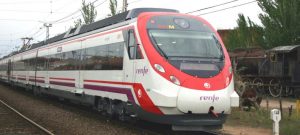 Toyota Motor Europe won a contract for the will supply of fuel cell modules for train project as member of FCH2RAIL a consortium with partners from Belgium, Germany, Spain and Portugal which is developing and testing a new zero-emission train prototype.
Toyota Motor Europe won a contract for the will supply of fuel cell modules for train project as member of FCH2RAIL a consortium with partners from Belgium, Germany, Spain and Portugal which is developing and testing a new zero-emission train prototype.
At the heart of the project there is a hybrid, bi-modal drive system that combines the electrical power supply from the overhead line with a fuel cell hybrid power pack consisting of hydrogen fuel cells and batteries that works independent of the overhead line.
“We want to show that this type of bi-mode train is a competitive and environmentally friendly alternative to the diesel train”, said Holger Dittus, the project leader and researcher from the German Aerospace Center – Institute of Vehicle Concepts (DLR).
The FCH2RAIL project was launched in January and the reference routes and operating scenarios for the prototype have now been defined as a first result. With a budget of 14 million euros, the project aims to develop, demonstrate and approve such a system within the next four years. The consortium was awarded a EUR 10 million funding to develop and test the hydrogen fuel train prototype.
“We embrace this opportunity of working within the consortium to bring our fuel cell technology to another type of hydrogen application. Hydrogen has an important role to play in helping decarbonise Europe’s railways, and we are excited to integrate Toyota fuel cell modules into the Fuel Cell Hybrid Power Pack,” Thiebault Paquet, Director of the Fuel Cell Business Group at Toyota Motor Europe said.
The project involves the conversion of a Civia electric train manufactured by CAF and provided by Renfe by integrating a fuel cell hybrid power pack and testing its performance under real conditions.
One of the central components of the on board energy system are the packaged fuel cell system modules from Toyota Motor Europe, while the batteries and power converters will be provided by CAF. Initial functional tests and trial runs for approval will take place on Spanish and Portuguese tracks with the support of the infrastructure managers Adif and Infraestruturas de Portugal (IP). The Spanish hydrogen research centre Centro National de Hidrogeno (CNH2) has been entrusted with the construction of a hydrogen fuelling station to refuel the prototype and in FCHPP testing before train integration.
Share on:



